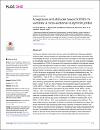Acceptance and attitudes toward COVID-19 vaccines: A cross-sectional study from Jordan
| المؤلف | El-Elimat, Tamam |
| المؤلف | AbuAlSamen, Mahmoud M. |
| المؤلف | Almomani, Basima A. |
| المؤلف | Al-Sawalha, Nour A. |
| المؤلف | Alali, Feras Q. |
| تاريخ الإتاحة | 2023-09-20T08:47:10Z |
| تاريخ النشر | 2021 |
| اسم المنشور | PLoS ONE |
| المصدر | Scopus |
| الرقم المعياري الدولي للكتاب | 19326203 |
| الملخص | Vaccines are effective interventions that can reduce the high burden of diseases globally. However, public vaccine hesitancy is a pressing problem for public health authorities. With the availability of COVID-19 vaccines, little information is available on the public acceptability and attitudes towards the COVID-19 vaccines in Jordan. This study aimed to investigate the acceptability of COVID-19 vaccines and its predictors in addition to the attitudes towards these vaccines among public in Jordan. An online, cross-sectional, and self-Administered questionnaire was instrumentalized to survey adult participants from Jordan on the acceptability of COVID-19 vaccines. Logistic regression analysis was used to find the predictors of COVID-19 vaccines acceptability. A total of 3,100 participants completed the survey. The public acceptability of COVID-19 vaccines was fairly low (37.4%) in Jordan. Males (OR = 2.488, 95CI% = 1.834-3.375, p .001) and those who took the seasonal influenza vaccine (OR = 2.036, 95CI% = 1.306-3.174, p = .002) were more likely to accept COVID-19 vaccines. Similarly, participants who believed that vaccines are generally safe (OR = 9.258, 95CI% = 6.020-14.237, p .001) and those who were willing to pay for vaccines (OR = 19.223, 95CI% = 13.665-27.042, p .001), once available, were more likely to accept the COVID-19 vaccines. However, those above 35 years old (OR = 0.376, 95CI% = 0.233- 0.607, p .001) and employed participants (OR = 0.542, 95CI% = 0.405-0.725, p .001) were less likely to accept the COVID-19 vaccines. Moreover, participants who believed that there was a conspiracy behind COVID-19 (OR = 0.502, 95CI% = 0.356-0.709, p .001) and those who do not trust any source of information on COVID-19 vaccines (OR = 0.271, 95CI% = 0.183-0.400, p .001), were less likely to have acceptance towards them. The most trusted sources of information on COVID-19 vaccines were healthcare providers. Systematic interventions are required by public health authorities to reduce the levels of vaccines hesitancy and improve their acceptance. We believe these results and specifically the low rate of acceptability is alarming to Jordanian health authorities and should stir further studies on the root causes and the need of awareness campaigns. These interventions should take the form of reviving the trust in national health authorities and structured awareness campaigns that offer transparent information about the safety and efficacy of the vaccines and the technology that was utilized in their production. |
| اللغة | en |
| الناشر | Public Library of Science |
| الموضوع | influenza vaccine SARS-CoV-2 vaccine |
| النوع | Article |
| رقم العدد | 4-Apr |
| رقم المجلد | 16 |
الملفات في هذه التسجيلة
هذه التسجيلة تظهر في المجموعات التالية
-
أبحاث فيروس كورونا المستجد (كوفيد-19) [848 items ]
-
أبحاث الصيدلة [1357 items ]


